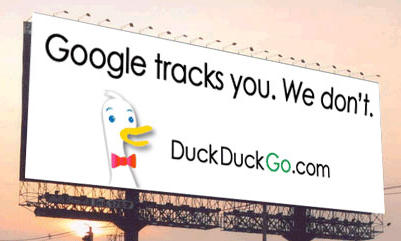DuckDuckGo, a small-time search engine, focuses its promotions on showing ways it’s (supposedly) better than Google. The current message?: DuckDuckGo lets you escape Google’s and Bing’s filter bubble!
What Is the “Filter Bubble”?

The concept of the “filter bubble,” as it is currently understood, was introduced by Eli Pariser of MoveOn.org during a TED Talks discussion. The idea can be broken down like this:
- The search engines want you to find the content you’re looking for.
- Most search sites (Google and Bing included) accomplish this in part by customizing your results to your geographic location, search history, and behavior on the web.
- Site perspectives gradually become more narrow as you are “learned” by the search engines; they show you only what they think you want to see.
- Results that may contradict your current opinion (or to take a line with a very different connotation, “expand your worldview”) will be demoted beyond the point of visibility.
DuckDuckGo doesn’t customize results to its users, so you’ll get a more diverse array of content types and perspectives, allowing you to altruistically see the myriad points of view offered by the web – or at least that’s the line DDG is going with.
DuckDuckGo’s Anti-Filter Movement
DDG released a new web page on the topic of filter bubbles, discussing the potential problems they raise while using snapshots from pop media – like the “more cowbell” SNL skit, “The Matrix,” XKCD, and more. They then direct users to their search engine as a way to avoid that dreaded, bubbled fate.
As noted on TechCrunch, Google does allow the &pws=0 code to be added to the end of any search query, signaling the SERP to provide non-personalized results. However, that’s not exactly common knowledge, nor is there an easy “unpersonalized” button on Google’s search page.

This isn’t the first time DDG has directly targeted Google in its promotional efforts. A previous DDG slogan of “Google Tracks You. We Don’t,” was plastered across websites, billboards, and more. Most recently, DuckDuckGo questioned the quality and accuracy of search engine traffic numbers.
It’s all part of the same idea, however. Users aren’t giving DuckDuckGo personal information that would be mandatory for personalized filtering. The current advertisement argues that users benefit all around. Not only are they not giving their personal data, but they are breaking out of the filter bubble, too.


Leave a Reply
You must be logged in to post a comment.